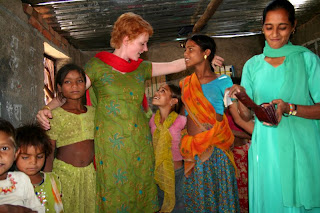Real life
This week has presented many challenges as we get deeper into the project and especially in the community empowerment aspect of our work. The villagers prove difficult to convince of hygenic and health improvements and some of us have felt the first disappointment in connection to this. This experience fell on the same day that the police decided to show up in Chandiya Kheri while we were having our lunch break. As we sat there in the scorching heat of mid-day sun, the officers stepped out of their jeep in full uniform and asked to see our papers. They asked if the Kanjars misbehave around us. They rolled out their power symbols with their heavy boots and knotted faces and told us without speaking that they call the shots in this area.
One officer, the higher ranking, smiled at us. He took off his baret and said "Kanjar habitual criminals. Mentality not good" and this kind of stuff. The leader of Chandiya Kheri, Umraobai, smiled cynically and said in a peaceful voice that it was too late to save her generation but the children are the hope for the future. The officer spoke in a husky voice to her, smiled and they looked like they agreed. We didn't understand much. But the one thing that is never to be mistaken is the intimidation, the trademark of representatives of power in secluded areas where no one can pierce the foggy wall of bureacracy and institutionalism.
It might seem harsh to judge 'the system' like this. It is however based on my own observations in this particular town. Alongside these views of the authorities in town, I everyday realise new truths about the Kanjars. We've known form the beginning that some of them are criminals. However, it has been difficult to figure out what kind of crimes they commit. When we ask the police they say 'habitual'. I wonder what that means. We have so far held ourselves neutral in interactions with the police, merely frowning at their statements that all Kanjars are criminals, and their accusations against the children we teach in school. But since it looks like we're going to have regular run-ins with the authorities, it is high time that we have a realistic discussion with the adults in the villages about the extra-legal activities. To know what we're dealing with. To know what to defend and what to attack. To know who and how to protect the children. And from what.
We were given the impression that their crimes are theft, fraud and liquor production. In the night, they sneak up to the main road and crawl unto trucks parked by the side of the road for the night. They move like scavenge hunters through the merchandise in the vehicles. In the pitch black night, there's no chance of knowing what you are stealing. In the morning, we meet children with bracelets made of tiny metal rings. They have an endless amount of these rings that seem to be material for fences or something similar. Entirely useless things.
Somehow, meeting the police and hearing them talk about a 'mentality change' in the Kanjari communities seems unreal. The olde saying proves true - you teach what you most of all need to learn. This is a fact of the situation here. The police do not recognise that the mentality cannot change unless they prove themselves to be excellent examples, not using the Kanjar men and children as scapegoats in every unsolvable case they get. They too are habitual criminals. The crux of the matter here is that the mentality which needs changing is the social mentality of interaction between Kanjar communities and everyone outside it. It has very little to do with the crimes committed by either side. It has absolutely everything to do with a society that grows larger distance between rich and poor by the second; a society that allows for history to set its irreversible mark on every new human brought into a particular group. This is the true tragedy of the Kanjars and the Jhalra Pattan population - for they both lose important wisdom by not knowing each other. It is a tragedy that is replayed all over India every single moment a child gets born. Change is coming but I feel it could really need a severe push by now...



1 Comments:
Sara, thank you for some very interesting and thought awakening notes from your place in Rajasthan, India.
It is most interesting to read your fine observations of things as you see them. And we appreciate your clear reflections concerning relations between the Kanjars and the surrounding society. I hope you may – all of you – succeed in pushing things a little bit in favour of that so much needed change of mentalities.
Many greetings
Gunnar (Nanna’s father).
Post a Comment
<< Home